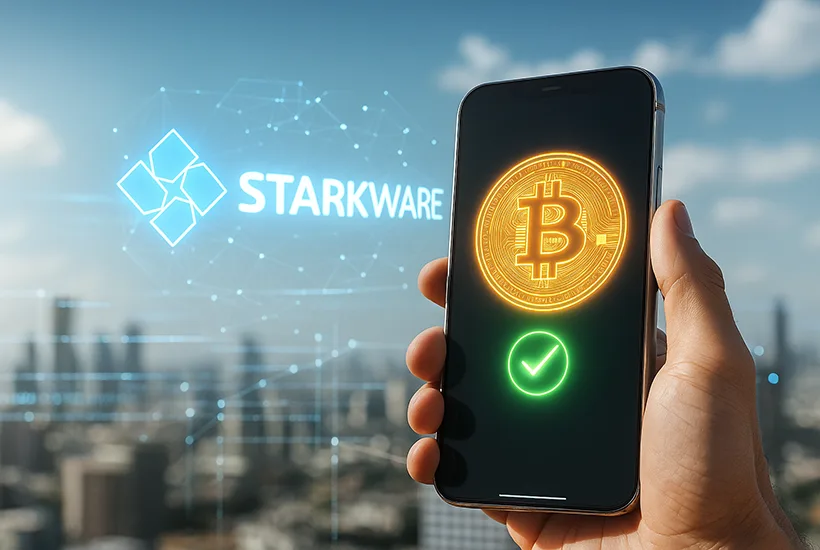- StarkWare introduces a zero-knowledge proof for Bitcoin that enables mobile verification without downloading the full blockchain.
- The new verification technology is lightweight (1MB) and provides users with fast transaction confirmation in under 100 milliseconds.
- Bitcoin Core plans to remove the OP_Return limit in the upcoming Bitcoin Core 30 update, which could lead to increased centralization risks and higher node resource requirements.
StarkWare, a leader in zero-knowledge (ZK) technology, has unveiled a zero-knowledge proof designed to allow Bitcoin users to verify payments without the need to download the entire Bitcoin blockchain. The innovative ZK proof is lightweight, running at only 1 megabyte (MB), and can be executed on mobile devices in under 100 milliseconds.
This new ZK proof covers all Bitcoin block headers from the genesis block to the present, without requiring users to download the entire Bitcoin blockchain history, which currently exceeds 680 gigabytes in size. Each block header contains essential data such as the version number of the Bitcoin software, timestamps, the block size, and the nonce, the random number miners must solve to add a block to the blockchain.
Improving Bitcoin verification for mobile users
ZK proof offers a significant advancement in making Bitcoin more accessible, particularly for mobile users. Unlike traditional methods of verifying Bitcoin transactions, which require running a full node, this lightweight verification eliminates the need for users to store the entire blockchain history.
Newsletter
Get weekly updates on the newest crypto stories, case studies and tips right in your mailbox.
The ZK verification builds upon Simplified Payment Verification (SPV), a concept introduced by Satoshi Nakamoto in Bitcoin’s white paper. SPV allows lightweight nodes to verify transactions without having to download the entire Bitcoin ledger, making it possible for mobile users to confirm payments with minimal data storage.
Lowering the cost of Bitcoin node operations
The announcement is noteworthy because it allows Bitcoin users to verify transactions without setting up a full Bitcoin node, which can be expensive to run typically costing between $300 to $1,000 and requiring technical expertise to install. StarkWare’s ZK technology offers a practical solution to this challenge, lowering the barrier to entry for average users.
The issue of node storage requirements and the size of the Bitcoin ledger has become a point of contention within the Bitcoin community. While Bitcoin nodes can run on personal computers, they still require significant storage due to the size of the blockchain. Some critics argue that if Bitcoin nodes become too resource-intensive, the network could face centralization risks, with large service providers becoming the primary operators of nodes, contrary to Bitcoin’s core principle of decentralization.
Concerns over blockchain bloat and non-monetary data
As Bitcoin’s ledger grows, concerns have been raised about the impact of non-monetary data, such as inscriptions and ordinals, on Bitcoin’s decentralization. These types of data storage increase the size of the blockchain, requiring node operators to store substantial amounts of non-financial data, which could undermine the ability of individual users to participate in the network.
In response to these concerns, Bitcoin Core, the team behind the software used by around 80% of Bitcoin node runners, announced plans to remove the OP_Return limit in its upcoming Bitcoin Core 30 update. Currently, OP_Return is limited to 80 bytes, too small to store modern images or multimedia content. This proposed change has already sparked significant interest, with a marked increase in the number of users running Bitcoin Knots nodes, which offer more customizable settings for handling OP_Return data.
Since the announcement, Bitcoin Knots nodes have grown from 1% of the market share at the end of 2024 to nearly 20% in 2025, showing the growing demand for customizable node configurations.
 Nazia Saeed
Nazia Saeed









